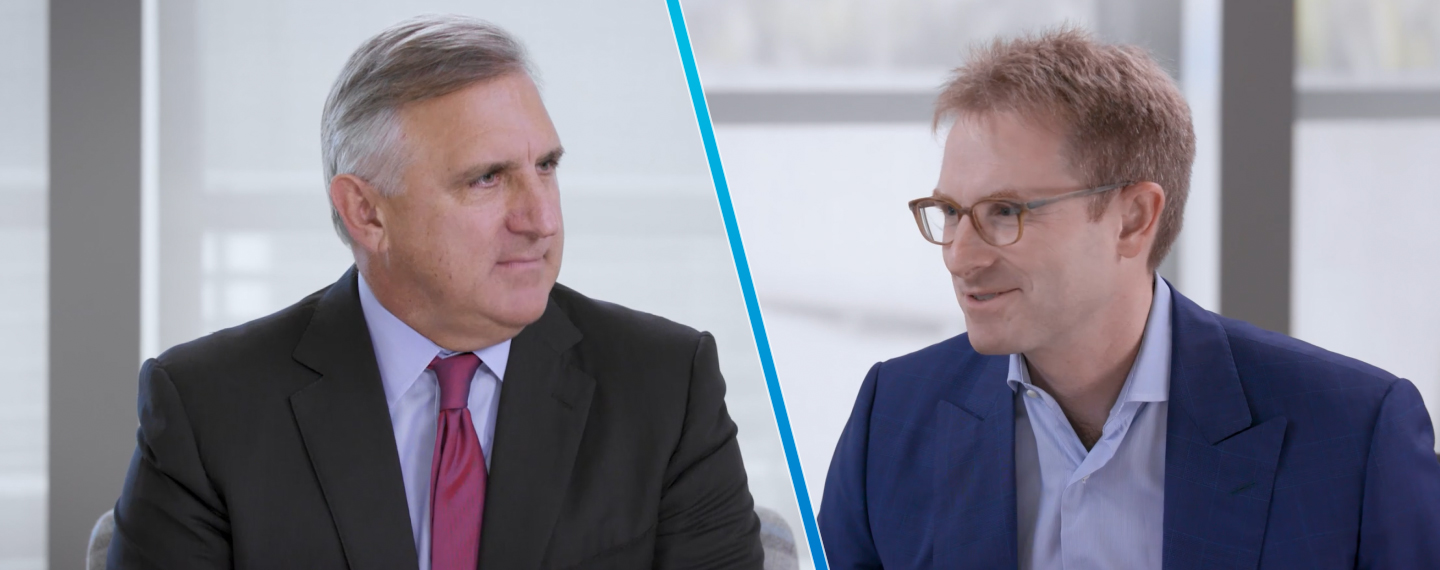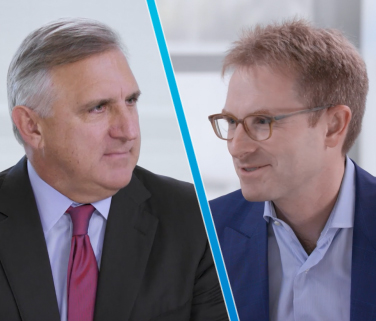As part of the financial services firm’s "Exceptional Leaders/Exceptional Ideas" video series, Amgen’s CEO discusses how innovation is key to the company's ability to serve patients, deliver strong financial results and attract the best talent.
On September 28, 2022, Amgen CEO Bob Bradway sat down with Matthew Harrison, managing director and head of biotech industry research at Morgan Stanley, to discuss Amgen's strategy of providing innovative medicines that make a big difference for patients suffering from serious diseases. The conversation coincided with "Mission Week" at Amgen and was published recently as part of Morgan Stanley's series of "Exceptional Leaders/Exceptional Ideas" interviews with leading CEOs across a range of industries.
"We like to say at Amgen, 'innovate or die'," Bradway told Harrison. "We believe we can earn a return [on our R&D investments] when we're able to generate innovative new molecules that have a very big effect size for the patients who use them, and where the unmet medical needs are high. If we are able to develop medicines that keep people out of the hospital and that improve a condition not just marginally but profoundly, then society should see that as a good investment." Bradway noted that one area where Amgen is focused on delivering innovation is cardiovascular disease, given that it is responsible for one of every three deaths globally.
Asked whether biosimilar medicines represent a threat to Amgen, Bradway noted that patent expirations are a fact of life in the biotechnology industry and spur the quest for new innovations. Amgen has also built its own industry-leading biosimilars business, taking advantage of its world-class manufacturing capabilities to ensure quality, safety and reliability.
"Manufacturing biologic medicines is a highly complex, science-rich process," he explained, adding that Amgen has always seen it as an area of potential competitive differentiation. "Our industry is littered with companies that lost control of their destinies because they couldn't reliably manufacture complex molecules."
Looking toward the future, Bradway said, "We're incredibly excited about what's happening at the intersection of biology and computing technologies, and in particular machine learning." He noted that Amgen had long anticipated the solution to a four-decade challenge: how to predict a protein's three-dimensional structure from its one-dimensional sequence of amino acids. Google subsidiary DeepMind solved this challenge in July 2021 and published the algorithms it used to do so. "We are already seeing benefits in the speed at which we are able to design new molecules," Bradway observed.
Bradway emphasized that Amgen's ultimate success hinges not on technology, but on attracting and retaining the very best talent. "There's nothing more important than people," he declared, noting the importance of "creating an environment for them to pursue the science and push the boundaries of biotechnology."
"People who want to change the practice of medicine are attracted to an environment like this where we have the resources and the caliber of people across all the different parts of our business to be able to successfully do that," he emphasized. "The common thread is people who don't accept 'no' for an answer, and that attracts other people who want to be part of that innovative environment."
Click here to view Bob Bradway's interview with Morgan Stanley's Matthew Harrison.





